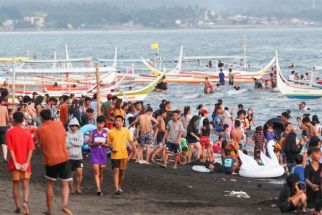Meeting global standards

One of my uncles worked all his life as a merchant marine. So did two of his sons. They liked international travel, and the pay was good.
It is said that every commercial vessel on the planet has at least one Filipino in its crew. The truth may be close to it. In my overseas trips pre-pandemic, I often ran into Filipino seafarers. Most of them seemed happy with their work. Filipinos usually are when we feel properly compensated.
The job, of course, is not without risks: almost every commercial ship hijacked by Somali pirates also included Filipino crewmembers.
So it can be worrisome to hear that 50,000 Filipino seafarers on ships flying European Union flags might lose their jobs, if the Philippines fails to comply with global Standards of Training, Certification and Watchkeeping (STCW) governing the merchant marine industry.
The STCW Convention was drawn up in 1978 by the International Maritime Organization. The IMO is a specialized agency of the United Nations, whose responsibility covers the safety and security of shipping as well as the prevention of marine and atmospheric pollution by ships.
In March 2014, Republic Act 10635 was enacted into law, making the Maritime Industry Authority the sole agency responsible for overseeing the country’s compliance with the STCW. President Marcos recently tasked the Departments of Labor and Employment (DOLE), Migrant Workers, Transportation as well as Foreign Affairs to assist the MARINA and the Commission on Higher Education (CHED) in the task. Whether this is allowed under RA 10635 is unclear.
Before RA 10635 was signed, the task was handled by the Maritime Training Council. The ad hoc MTC, attached to the DOLE, involved nine agencies from various executive departments, all of which reportedly represented themselves at IMO meetings as overseers of the STCW in the Philippines.
* * *
Amid recent reports, transport officials have stressed that Filipino seafarers on European-flagged vessels are not about to lose their jobs because the country is failing the STCW audit conducted by the European Maritime Safety Agency.
EMSA is the body tasked by the European Commission to conduct external evaluations of compliance with the STCW by countries such as the Philippines, one of the world’s largest sources of seafarers for merchant ships.
MARINA officials point out that the STCW is not a convention on maritime labor but on maritime safety. It sets the minimum global standards for training, certification and monitoring of seafarers deployed in merchant ships plying international waters.
Sonia Malaluan, MARINA officer-in-charge deputy administrator, explains that rules and codes of conduct set by the IMO governing international shipping are constantly evolving, so periodic evaluations are conducted. The EMSA does external evaluations for the member states of the European Union.
I remember that I have been discussing the issue for about a decade now, with a succession of EU ambassadors assigned in Manila. The last EMSA audit was conducted in February 2020.
Facing “The Chiefs” last week on One News, Malaluan said MARINA submitted its report of compliance to EMSA in March this year, and is waiting for feedback on whether the European Commission will withdraw its recognition of STCW Certificates issued by the Philippines.
The MARINA report was done in consultation with the CHED, which in 2018 was tasked by the Duterte administration to inspect maritime schools for compliance with the STCW Convention.
From 155 deficiencies noted by EMSA in 2013, the number went down to six in 2014 when the MARINA became the sole agency responsible for ensuring compliance with the STCW. There were no EMSA inspections in 2015 and 2017, but the deficiencies went up to 42 in 2017.
In 2020, the EMSA grievances were down to 23 – the subjects addressed in the MARINA report submitted last March. Malaluan says the country has completed addressing 18 of the grievances.
* * *
Some quarters are blaming the jump in the deficiencies, from just six in 2014, to the frequent leadership changes in the MARINA (five administrators and OICs, with diverse backgrounds, during the Duterte administration, with a retired military chief serving only for six months). The leadership changes meant policy swings that derailed efforts to implement sustained maritime training standards.
Malaluan told us that some maritime schools have inadequate simulators or laboratories for onboard training – a requirement for graduation – commensurate to the size of their student population. MARINA is considering imposing a carrying capacity for the equipment. Other schools, on the other hand, do not want to let their students use the equipment, apparently to protect these from wear and tear.
There are complaints that MARINA is imposing unreasonable or unnecessary training requirements. In response, MARINA is considering retaining the management training requirements only for those aspiring to become ship officers, under a ladderized program, as instructed by Marcos.
Malaluan noted that of over 600,000 Filipino seafarers deployed overseas, only about 100,000 are officers. Under the planned ladderized program, the four-year course will be mandatory only for officers, with the applicants required to pass a national admission test. The rest, called “ratings,” can opt for shorter non-officer courses.
* * *
In previous years, as maritime schools mushroomed to meet the large demand and there were complaints of poor training provided, there were reports that certain politicians and other influential personalities prevented higher education authorities from shutting down the substandard schools.
Malaluan explained that several schools were in fact shut down, but due process must be followed in assessing whether several others also need to be shuttered.
The problems besetting maritime schools reflect the problems plaguing the entire Philippine education system. Some years ago, several nursing courses and nursing schools were also shut down following the dismal performance of their graduates in licensure examinations. Certain medical schools deemed to be nothing but diploma mills were also put on notice.
In the case of maritime schools, at least there is an international body setting global minimum standards that must be met for employment. With thousands of jobs at stake, the country cannot afford to ignore those minimum standards.
Malaluan says the country is determined to meet global standards. She points out that EMSA evaluation “is a continuing process,” focused not so much on the findings but on how deficiencies are corrected.
“If they are not satisfied, they return, find out how (the deficiency) can be improved,” she said.
Echoing Transport Secretary Jaime Bautista, whose department supervises MARINA, Malaluan pointed out that through all the external assessments conducted by EMSA, Filipino seafarers have kept their jobs.
“Since 2006, we are still recognized, up to this moment,” Malaluan said. “All our seafarers are still on board the European flagships.”
- Latest
- Trending
























